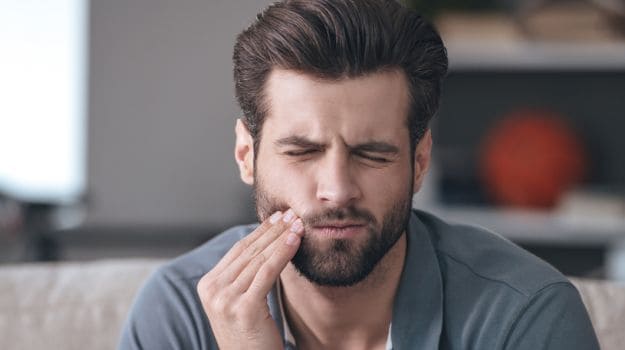How Cold And Hot Beverages Lead To Tooth Sensitivity – Expert Explains
[ad_1]
A decent set of teeth does not necessarily refer to sparkling and perfectly aligned teeth, but encompasses healthy teeth. However, this is not always the case, as can be seen in persons having sensitive teeth. Most definitely, not an enviable state to be in. Tooth sensitivity occurs when the enamel wears away, and nerves are exposed. There are multiple reasons for this, such as crooked teeth, poor oral hygiene, and exposed root surfaces. Then there are the edibles, and their associated temperatures and ingredients- read hot and cold food, and sweets.
Chipped or cracked teeth can expose the nerves inside them, thus causing sensitivity to increase. If fillings become worn or loose, they may no longer be effective in protecting the nerves under the area of decay. Dentin can also become an irritant with the overuse of tooth-whitening agents like baking soda or lemon. These harsh ingredients can lead to the thinning of the layer of enamel around dentin, thus exposing the tender tubules.
Also, if drinking iced tea, hot coffee, or any edible item at extreme temperatures or extreme sweetness causes you pain, there is a high possibility that you have dental sensitivity.
(Also read: Sensitive Teeth? 5 Natural Ways For Relief From Tooth Sensitivity)
How Cold And Hot Beverages Lead To Tooth Sensitivity:
Cold beverages:
Consuming chilled aerated drinks, juices, and other cold liquids – and ice creams – can irritate sensitive teeth and cause other major health conditions, such as cavities, tooth decay, and poor health of the gums. One reason for receding gums is poor oral hygiene, using a stiff toothbrush and improper brushing procedures, the grinding and clenching of teeth, and aging.
Hot beverages:
Sensitive teeth may experience great pain with hot drinks or food items that are heated to extremely high temperatures. This can result in various tooth problems and cause immense pain.

Many food items may cause tooth sensitivity
Sweets:
These words have been heard by every person in their childhood days – “Don’t eat too many sweets.” This warning comes with very good reason. Foods like candies and chocolates have high sugar content, which fills cracks in the teeth and causes recession of the gums. This, in turn, leads to tooth decay, triggers sensitivity, and can also lead long-term tooth problems.
Acidic food:
Sour food also causes tooth sensitivity. Eating highly acidic food has the potential of causing two problems – it can damage the tooth enamel and weaken the gum line, which then leads to the exposure of the inner layer of the teeth. The nerve centre is more exposed, which can lead to tooth sensitivity. The enamel van be viewed as a strong shield that protects the crown of the tooth, just above the gum-line.
(Also read: Beware! These 5 Foods Are Known to Stain Your Teeth)
One way to make brushing sensitive teeth easier is to use a toothbrush and toothpaste specially designed for this purpose – sensitivity – and a gentle floss. Most sensitivity toothpastes, including leading sensitivity brands, first numb the nerves inside the teeth. They fight sensitivity at the root by treating the gum line.
Do not ignore the signals: Any signs of tooth sensitivity should trigger an immediate action-visit your dentist. Tooth sensitivity should not be ignored, as it could lead to problems like bleeding gums and enamel damage, which, in turn, can lead to long-term tooth damage. These problems can be alleviated by brushing your teeth twice a day, as well as visiting your dentist on a regular basis.
Author’s Bio: Dr. Namrata Rupani is the founder and CEO at Capture Life Dental Care
Disclaimer: The opinions expressed within this article are the personal opinions of the author. NDTV is not responsible for the accuracy, completeness, suitability, or validity of any information on this article. All information is provided on an as-is basis. The information, facts or opinions appearing in the article do not reflect the views of NDTV and NDTV does not assume any responsibility or liability for the same.
[ad_2]
Source link





